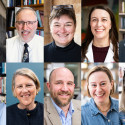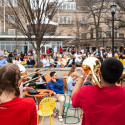Broadcaster marks two decades celebrating ‘music of community’

“Simply Folk” is broadcast on Wisconsin Public Radio stations at 5 p.m. Sundays. The show airs locally on WERN (88.7 FM). |
Somewhere in Wisconsin, a couple of confirmed nondancers lumber to their feet and eke out a tentative and unfamiliar schottische on their living room rug.
Celtic airs from the band Far From Home waft from the radio and give their tootsies a little guidance, but clearly this pair has strayed rather far from their usual sedentary pattern.
Maybe it was the wife who finally prevailed upon her husband to get up and dance. Or maybe it was the music that got the better of them both.
Judy Rose hopes it was at least a little of the latter that lured the novice dancers to the floor. Interaction – between musicians, of course, but also within her “Simply Folk” audience – is the bedrock of the 20-year-old Wisconsin Public Radio program.
The philosophy of participation, direct or indirect, has permeated “Simply Folk” from the very beginning, when Becca Pulliam and Tom Martin-Erickson shared the host’s mike. Rose joined them in 1980 and assumed sole hosting duties in 1991.
As the “Simply Folk” chief architect, Rose draws upon several models. “We might feature a concert or festival recording, or one of the singer-songwriters who visits the state, like Garret Rogers from Canada, Tien Hulcani from Mexico or Vasen from Sweden. Some shows might be seasonal – recently one was devoted to music about apples. On Halloween we’ll play ghost songs and stories,” she says.
Rose dedicates the second Sunday of the month to listener requests. There are those, she says, who have been requesting regularly during the last two decades. “I know the names of children and grandchildren of some listeners,” she says.
Of course, listener involvement with the music is at the root of this virtual community, Rose says. Active musical participation is part of her own family heritage, starting with the cowboy songs her father absorbed in the 1920s as a bachelor clergyman in Montana.
Rose inherited her father’s love of folk music. “As a youngster I would much rather play songs from the Fireside Book of Folksongs than work on assigned pieces. I learned all the ballads in the Fireside book – the stories of false “Barbara Allen” or the grieving “Wife of Usher’s Well” and her ghostly sons were and are better than movies for me,” she says.
What especially appealed to her was the universal subject matter of those musical tales, she says. “The best songs are about the human condition, and that connects us, to each other and to people of different times and places. For example, Oliver Myukudzi of Zimbabwe writes poignant songs about the AIDS epidemic that remind me of a much earlier song in which a young woman poisons Lord Randall,” she says.
The ease with which music can find its way to listeners is all the more reason to protect and celebrate our musical histories, she adds.
“Folk music concerts, festivals and CDs put us in touch with the music of other cultures. But we should make sure we celebrate what’s distinctive about us, too – ever since the Welsh came to Wisconsin there have been Gymamfa Ganu – hymn sings – around the state each summer. The hymns are sung in Welsh, in robust harmony, and all are welcome.
“To me that’s the essence of folk: music of community, made by community.”



